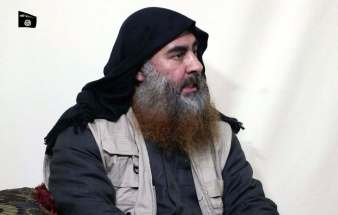Death of IS leader does not end danger
Read this article for free:
or
Already have an account? Log in here »
To continue reading, please subscribe:
Monthly Digital Subscription
$0 for the first 4 weeks*
- Enjoy unlimited reading on winnipegfreepress.com
- Read the E-Edition, our digital replica newspaper
- Access News Break, our award-winning app
- Play interactive puzzles
*No charge for 4 weeks then price increases to the regular rate of $19.00 plus GST every four weeks. Offer available to new and qualified returning subscribers only. Cancel any time.
Monthly Digital Subscription
$4.75/week*
- Enjoy unlimited reading on winnipegfreepress.com
- Read the E-Edition, our digital replica newspaper
- Access News Break, our award-winning app
- Play interactive puzzles
*Billed as $19 plus GST every four weeks. Cancel any time.
To continue reading, please subscribe:
Add Free Press access to your Brandon Sun subscription for only an additional
$1 for the first 4 weeks*
*Your next subscription payment will increase by $1.00 and you will be charged $16.99 plus GST for four weeks. After four weeks, your payment will increase to $23.99 plus GST every four weeks.
Read unlimited articles for free today:
or
Already have an account? Log in here »
Hey there, time traveller!
This article was published 28/10/2019 (2240 days ago), so information in it may no longer be current.
The United States armed forces performed a precious service to international peace on the weekend by carrying out the raid in northwestern Syria that led to the death of Abu Bakr al-Baghdadi, the cruel leader of the Islamic State (IS) movement who erected an improvised government in the wreckage of eastern Syria and western Iraq. He lured Muslim youth from around the world to help him enslave the people he ruled.
Trump says US forces cornered IS leader in dead-end tunnel

Posted:
WASHINGTON - Abu Bakr al-Baghdadi , the shadowy leader of the Islamic State group who presided over its global jihad and became arguably the world's most wanted man, died after U.S. special operators cornered him during a raid in Syria, President Donald Trump said Sunday.
His jihadist movement proclaimed a caliphate — a Muslim empire — in the Iraqi city of Mosul in 2014. Kurdish fighters and others drove IS out of Mosul two years later. The movement and its caliphate have been in decline ever since. The death last weekend of Mr. al-Baghdadi, who blew himself up when cornered by U.S. commandos, marks a further stage in the movement’s decline.
IS, also known as Daesh, was an offshoot of the older al-Qaida organization. Both are dedicated to the mission of jihad — holy war against the non-Islamic world, aiming to impose Islamic law wherever it could achieve control. Mr. al-Baghdadi was a powerful preacher of jihad, skilfully using the internet to recruit members for his movement from Canada, the United States, Europe and Asia.
The dream of erecting a caliphate will not die so easily. The word and the idea recall a time 1,000 years ago when Islamic civilization far outshone the West in technology, sophistication and power, and when Muslims governed the Mediterranean world from Cordoba to Baghdad. For Muslims today who lament the political and economic weakness of the Islamic nations, the dream of a caliphate offers a hope of winning back the international standing that Islam enjoyed in an earlier era.
A U.S. navy Seal team in 2011 raided the Pakistani hiding place of al-Qaida leader Osama bin Laden and killed him. The killing weakened al-Qaida, though its local branches in Afghanistan, in Mauritania, in Mali and in Nigeria carried on the struggle. Its role as the leading recruiter of jihadists was quickly taken by Mr. al-Baghdadi and IS. The former al-Qaida strategy of attacking U.S. cities was abandoned. IS led the way in seizing control of failed states of the Muslim world.
If IS falls silent after the loss of its leader, another jihadist movement may easily step forward to take its place.
The jihadist war against the West has touched Canada in a few scattered attacks on Canadian soldiers and against the House of Commons in Ottawa. A few hundred young Canadian Muslims fell for the promise of adventure and salvation held out by Mr. al-Baghdadi and other preachers of jihad. A few of these have recently been seeking to return to Canada after their adventures with the caliphate.
The social media structure by which jihadist movements spread hatred of the western countries is still in place, and doubtless is still appealing to young Muslims resentful of their ill treatment in non-Muslim countries. If IS falls silent after the loss of its leader, another jihadist movement may easily step forward to take its place.
Canada’s intelligence services need to keep a close eye on internet recruitment efforts directed at young Canadian Muslims and others sympathetic to the jihadist cause. Canadian parents whose children are taking an interest in the Muslim world need to find out what friends their children are listening to and what travel plans they are making. Canadian police forces need to hire officers with Arabic language skills and a capacity for keeping an eye on the local jihadists.
The U.S. army has knocked off Mr. Big, but the danger to Canadians is not over.









